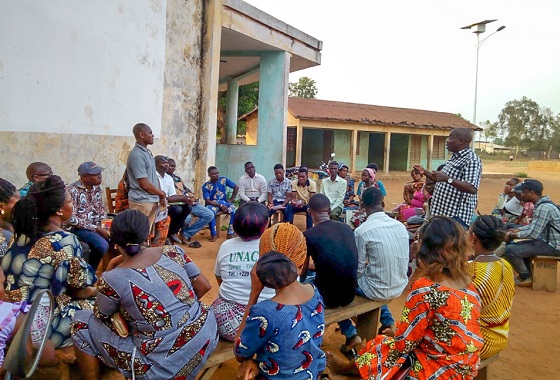Research
March 6, 2024
New study aims to promote perinatal mental health screening and reduce the burden of perinatal mood and anxiety disorders in Kenya
Categories: Awards, HIV, Mental Health, Research
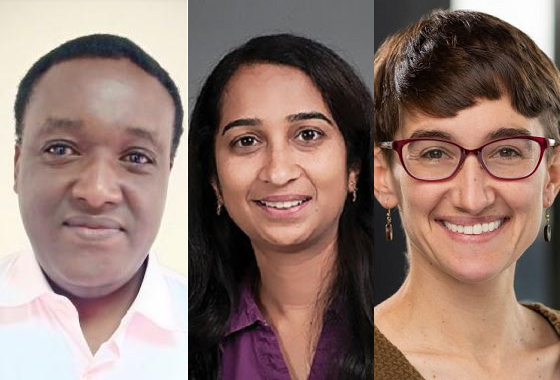
Multiple Principal Investigators Drs. John Kinuthia, Amritha Bhat, and Keshet Ronen
January 30, 2024
DW3 Spotlight on World NTD Day
Categories: Gut Health and Child Survival, Publication, Research

On World Neglected Tropical Diseases (NTD) Day, we celebrate the accomplishments of the DeWorm3 study in the fight against NTDs and call on the global health community to renew our commitment to creating a healthier, more equitable world for all.
DeWorm3 is a large clinical trial that aims to determine the feasibility of interrupting the transmission of parasitic worms, known as Soil Transmitted Helminths (STH), through community-wide mass drug administration (cMDA) that provides deworming medication to individuals of all ages in selected communities in Benin, Malawi, and India. STH are associated with nutritional deficiencies, cognitive impairment, and developmental problems amongst people who are heavily infected. The World Health Organization estimates that 1.5 billion individuals are infected with STH, representing 24% of the world’s population. The project began in 2016 with results expected in Spring of 2024. (more…)
January 26, 2024
Announcing the 2023-2024 UW Rising Star Award Recipients
Categories: Awards, Gut Health and Child Survival, Research
The Global WACh and Enterics for Global Health (EFGH) Shigella surveillance study (housed within the center) are pleased to announce the four recipients of the 2023-2024 Rising Star Award cycle. A goal of the award program was to identify highly talented junior investigators from institutions in low-middle income countries (LMIC) who are committed to a career in research in woman, adolescent, and child health broadly, and in pediatric enteric and diarrheal disease. To learn more about the award program and previous recipients, visit our informational webpages on the Global WACh and EFGH study sites. Meet our Rising Stars!
December 21, 2023
SEEMS-Nutrition project publishes a how-to guide for measuring costs and benefits of multisectoral nutrition strategies
Categories: Nutrition, Publication, Research
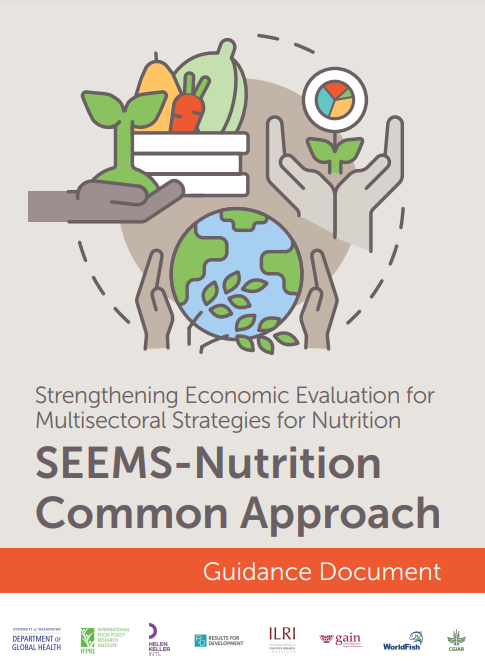 Since 2019, researchers and partners of the Strengthening Economic Evaluation for Multisectoral Strategies for Nutrition (SEEMS-Nutrition) project have aimed to fill an information gap on costs, cost-effectiveness, and benefits of scaling up food system strategies in resource-constrained areas combating malnutrition. They developed a common approach to conduct costing studies that is integrated with program impact evaluations for multisector nutrition programs.
Since 2019, researchers and partners of the Strengthening Economic Evaluation for Multisectoral Strategies for Nutrition (SEEMS-Nutrition) project have aimed to fill an information gap on costs, cost-effectiveness, and benefits of scaling up food system strategies in resource-constrained areas combating malnutrition. They developed a common approach to conduct costing studies that is integrated with program impact evaluations for multisector nutrition programs.
(more…)
December 14, 2023
Book Talk – “Enough: Because We Can Stop Cervical Cancer”
Categories: HIV and Co-Infections, Research, Talks and Events
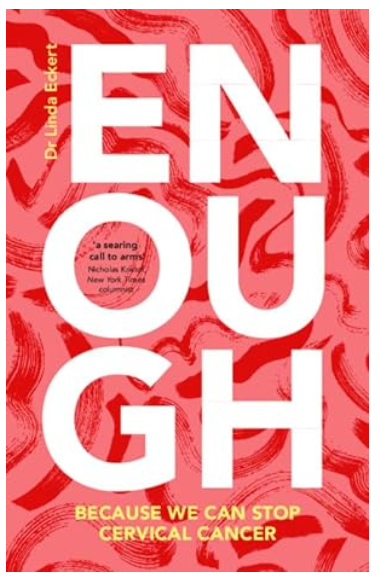 On December 7th, Global WACh hosted an engaging book talk around Dr. Linda Eckert’s upcoming book, Enough: Because We Can Stop Cervical Cancer. The book is a passionate call to action to eliminate needless deaths from cervical cancer, by combatting healthcare inequities women face. The book is available to pre-order where ever one gets books.
On December 7th, Global WACh hosted an engaging book talk around Dr. Linda Eckert’s upcoming book, Enough: Because We Can Stop Cervical Cancer. The book is a passionate call to action to eliminate needless deaths from cervical cancer, by combatting healthcare inequities women face. The book is available to pre-order where ever one gets books.
If you missed the event, watch it here: https://youtu.be/rslThfhCasQ?si=qY3JYZYL-F-L4ISc
Learn about other opportunities to learn about the book and discuss cervical cancer:
- Listen to the NewBooks podcast interview: https://newbooksnetwork.com/linda-eckert-enough-because-we-can-stop-cervical-cancer-cambridge-up-2024
- Download a copy of the “Approach to Educators” flyer about potential ways the book could be used in a global health/education class.
- Opportunities to join local celebrations in Seattle:
- Jan 13th at 2 PM – Book launch at the University Bookstore (4326 University Way NE)
- Jan 16th at 7:30 PM – Town Hall Forum (1119 8th Ave)
- Feb 6th at 7:00 PM – Reading at Third Place Books (Ravenna Location) (6504 20th Ave NE)
- View the first book trailer: https://youtu.be/i0VOt0og5l0
November 29, 2023
Dr. Kirk Tickell joins the WHO Technical Advisory Group on Childhood Wasting and Oedema
Categories: Gut Health and Child Survival, Research
 Congratulations Dr. Kirk Tickell, MBBS, MPH, PhD, Acting Assistant Professor in the Department of Global Health, who recently joined the Research Sub-Working Group of the WHO Technical Advisory Group on Childhood Wasting and Oedema that advises on important research questions and prioritization in this field. Dr. Tickell joins a multidisciplinary group of experts and key stakeholders with the goal of advising WHO on a broad range of topics and issues related to acute malnutrition to improve the delivery of care and preventative interventions for malnourished children and their families. This convening supports the WHO’s new guideline to tackle acute malnutrition in children under five. (more…)
Congratulations Dr. Kirk Tickell, MBBS, MPH, PhD, Acting Assistant Professor in the Department of Global Health, who recently joined the Research Sub-Working Group of the WHO Technical Advisory Group on Childhood Wasting and Oedema that advises on important research questions and prioritization in this field. Dr. Tickell joins a multidisciplinary group of experts and key stakeholders with the goal of advising WHO on a broad range of topics and issues related to acute malnutrition to improve the delivery of care and preventative interventions for malnourished children and their families. This convening supports the WHO’s new guideline to tackle acute malnutrition in children under five. (more…)
August 18, 2023
DeWorm3 study publishes new papers, contributing to research on interrupting parasitic worms through community-wide mass drug administration
Categories: Gut Health and Child Survival, Publication, Research
The DeWorm3 research team continues to contribute to their body of research on the feasibility of interrupting soil-transmitted helminth (STH) transmission through community-wide mass drug administration (cMDA) in Benin, Malawi and India. Three new publications to highlight include the “Soil-transmitted helminth surveillance in Benin: A mixed-methods analysis of factors influencing non-participation in longitudinal surveillance activities”, the “Overestimation of school-based deworming coverage resulting from school-based reporting” in PLOS Neglected Tropical Diseases and “Policy stakeholder perspectives on barriers and facilitators to launching a community-wide mass drug administration program for soil-transmitted helminths” in the BMC Global Health Research and Policy.
(more…)
July 6, 2023
SEEMS-Nutrition researchers share costing analyses of nutrition-sensitive programs at ANH Academy Week
Categories: Nutrition, Research, students
In June, researchers from the Strengthening Economic Evaluation for Multisectoral Strategies for Nutrition (SEEMS-Nutrition) project attended the 8th annual Agriculture, Nutrition & Health (ANH) Academy Week held online and in-person in Lilongwe, Malawi. The ANH Academy Week gathers a community of researchers, practitioners and policymakers working at the intersection of agriculture, food systems, nutrition, and health to foster knowledge exchange, innovation, and learning.
SEEMS-Nutrition Project Director, Dr. Carol Levin (Health Economist and Associate Professor, Global Health), and graduate student research assistants, Esther Choo and Aisha Twalibu, represented the University of Washington/Global WACh. They, along with colleagues from Helen Keller International (HKI) and International Food Policy Research Institute (IFPRI), shared two posters and one oral presentation from costing analyses and a synthesis of costs from ongoing nutrition interventions in Nepal (focusing on women and children’s nutrition) and Burkina Faso (focusing on increased poultry production to improve nutrition). (more…)
June 14, 2023
New study aims to identify barriers to implementing national sickle cell disease management guidelines in Kenya
Categories: Awards, Gut Health and Child Survival, Implementation Science, Research, students
Sickle cell disease (SCD) is a multi-system, life-threatening condition characterized by chronic anemia, frequent episodes of painful vaso-occlusive crises, organ infarction and eventually widespread organ damage. Over 80% of the 240,000 children born with SCD in sub-Sahara Africa each year die before their fifth birthday. Despite the existence of evidence-informed guidelines around the use of disease modifying interventions necessary for the management of SCD, guideline implementation in the region is suboptimal leading to preventable morbidity and mortality. (more…)
June 6, 2023
Global WACh Student Poster Symposium celebrates and highlights student achievements over the academic year
Categories: Certificate Program, Research, students
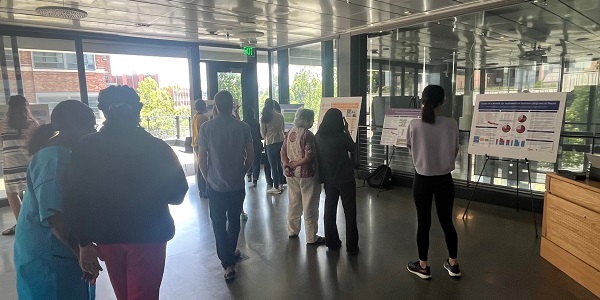
Members of the UW global health community gathered at the poster symposium in the Hans Rosling Center.
On June 1st, Global WACh hosted its first Student Poster Symposium to showcase scientific results by affiliated graduate student researchers and celebrate their achievements over the academic year. This hour-long event provided an opportunity for current students to share project summaries related to academic requirements (e.g. dissertation, capstone) or as Research Assistants supporting ongoing projects. Some posters were created for the event, while others were previously featured at other scientific conferences and could be accessible to the UW global health community. Faculty, staff, and students attended to view the posters and chat with the students to learn more about their contributions that help advance Global WACh’s science in collaboration with partner organizations. (more…)
Previous page Next page
